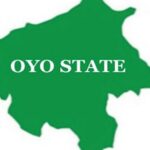The death of 66 Gambian children from acute kidney injuries has thrown Gambia and other West African countries into confusion.
The death, which was linked to contaminated cough and cold syrups from an Indian drugmaker, forced the World Health Organisation (WHO) to issue an alert, especially to West African countries.
Resurgence of kidnapping along Gusau-Funtua highway puts travellers on edge
PCN seals 19,059 illegal premises in 4 years
WHO had listed four suspected products as culprits: “Promethazine Oral Solution”, “Kofexmalin Baby Cough Syrup”, “Makoff Baby Cough” and “Magrip N Cold Syrup”.
However, the situation must have refreshed memories of victims and relatives of 100 Kano children with meningitis whom a drug manufacturer, Pfizer, used for trial testing its antibiotic trovafloxacin (Trovan) against ceftriaxone, during a 1996 meningitis epidemic in Nigeria.
While Trovan was a new drug when pfizer administered it on the young patients in a clinical trial, the cough syrups were said to be registered but contaminated drugs imported into The Gambia.
Director-General of WHO, Tedros Adhanom Ghebreyesus, said the four suspected syrups were tested and laboratory analyses confirmed “unacceptable” amounts of diethylene glycol and ethylene glycol, which are toxic and can lead to the acute kidney damage.
For the containment of spread of the suspected killer syrups, WHO requested that the disputed medicinal products be removed from the market.
However, it cannot be ruled out that the products, which had so far been identified in The Gambia, might have been distributed elsewhere in the sub-region through an informal market.
This, according to experts, needs proactive steps, and the quick response by WHO to halt the spread was not only timely but commendable.
The WHO advised countries to increase surveillance of the supply chains to detect and remove the substandard products. Importantly, it also called for the surveillance of informal or unregulated markets.
“If you have these substandard products, please do not use them. If you, or someone you know, have used these products or suffered any adverse reaction/event after use, you are advised to seek immediate medical advice from a qualified healthcare professional and report the incident to the National Regulatory Authority or National Pharmacovigilance Centre,” the WHO alert said.
The national authorities have been asked to report if any of these substandard products are discovered in their countries.
Spread possible in Nigeria
A Pharmacist, Adam Hayatuddeen, said the spread of the deadly syrup to Nigeria and other West African countries is possible especially through informal markets, but the containment is also achievable.
He said the containment is easier since the WHO had identified the syrups brand name and the location of the manufacturer.
“You know, there are products that are imported and those being manufactured or assembled in Nigeria locally.
“So, if it’s an import, the government must now look for those with the license to import the product. The products will now be subjected to sampling and quality assurance check to ascertain whether that product supplied to Nigeria is harmless or contaminated.
“This post market surveillance can be done at different points. That is from manufacturers up to the market points,” he said.
The Director, Public Affairs of the National Agency for Food and Drug Administration (NAFDAC), Abubakar Jimor, did not respond to several phone calls put to him by Daily Trust on Sunday despite a reply via text that he would speak.
However, another source in NAFDAC said that looking at the Nigerian indices, the situation can be tackled even if the product reaches the country’s market.
“To start with, I don’t think the syrups are registered drugs in Nigeria, and if by any means they entered into the country, there are measures given to NAFDAC by the WHO.
“Nigeria always follows the WHO regulations that is why we matured to ML3 stage on 30th March, 2022, with China behind us despite being one of the major manufacturers.
“So, if it is confirmed that the syrup is in the Nigerian market, stringent measures would be taken. We would identify the batches and the products, dispatch the post marketing surveillance unit to the market, and check pharmacy centres to mop them up.
“Very soon, a report will be out if truly the syrups are in the Nigerian market,” he said.
According to sources, India’s apex drug regulatory authority–the Central Drugs Standard Control Organisation (CDSCO)–has already launched an investigation into the matter after it was informed about the issue on September 29.
Other findings
The state regulatory authority of Haryana confirmed that the company did manufacture and export the syrups to Gambia. The company has so far sold the product only to Gambia.
Sources said four of the 23 samples tested by the WHO were found to be contaminated with diethylene glycol or ethylene glycol. However, the intra-government agency has not provided details to India on causal relation with the death – or documents to show that the syrups led to the deaths.
Diethylene glycol and ethylene glycol can cause toxic effects, including abdominal pain, vomiting, diarrhoea, inability to pass urine, headache, altered mental state, and acute kidney injury which may lead to death. “The substandard products referenced in this alert are unsafe and their use, especially in children, may result in serious injury or death,” the WHO alert said.
Victims’ parents may go to court
It was reported that parents of the deceased children who were diagnosed with acute kidney injury have started making consultations to determine the proper legal course of action.
The leader of the opposition Gambia Moral Congress, Mai Fatty, has confirmed to The Standard newspaper that two of the parents have contacted him.
Fatty, a trained lawyer, said they are in advanced consultations with other relevant stakeholders who are very keen to procure consequences.
He added that the death of 66 Gambian children must incur punitive legal consequences as it is very tragic for such young lives to be cut so short.
“We will be looking at a wide array of issues, including the entire value chain. Certainly, there are laws regulating drugs, their importation, storage, distribution and dispensation. There is a whole chain that must be unmasked and liability ascribed where it ought to,” Fatty said.
He added that there has been good cooperation although some of the culprits are outside the jurisdiction.
“But in this day and age, it is impossible to shield yourself permanently from the long arm of the law. We shall get to them at some stage,” he added.
Fatty said the Gambia Government should be commended for being forthright with information, for recalling the poison from the market.
“Some of the victims are now ready to do what is legally required. They are prepared to go to the moon, where legally feasible, to seek specific remedies, and I will support them,” he concluded.
Like the Pfizer case in Kano State, this may likely be another long legal battle between the victims’ parents and the Indian drug company “Maiden Pharmaceuticals”.
Although the US-based pharmaceutical giant “Pfizer” sought for out-of-court settlement and paid compensation after 15-year trial, all eyes are fixed on the Indian drugmaker on the next step to address the crisis.

 Join Daily Trust WhatsApp Community For Quick Access To News and Happenings Around You.
Join Daily Trust WhatsApp Community For Quick Access To News and Happenings Around You.


